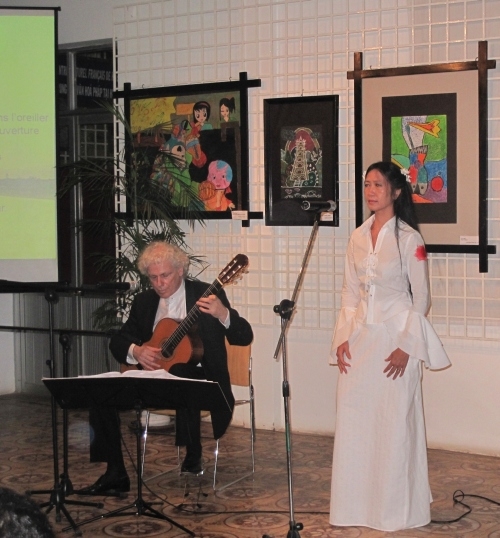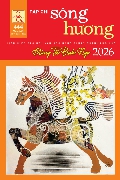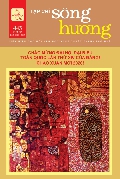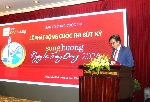(Bản dịch của Trương Đình Ngộ)

Sao, Vàng Sao (1)
Phong cách hát không nhạc đệm (A cappella)
Thượng thanh khí tiết ra nguồn tinh khí
Xa xôi đời trăng mọc nước Huyền Vi
Đây Miên Trường, đây Vĩnh Cữu tề phi
Cao cao vượt với hai hàng bóng vía
Trời nhật nguyệt cầu vồng bắc tứ phía
Ôi Hoàng Hoa, hồn phách đến nơi đây
Hương ân tình cho kết lại thành dây
Mong manh như lời nhớ thương hàng triệu.
Đàn cung bậc gió dồn lên âm điệu
Sững lòng chưa, say chấp cả thanh bai
Sang chơi thôi, sang chơi thôi, mà ai ?
Thu đây rồi bước lên cầu Ô Thước
Sao! Vàng sao rơi đầy trên sóng nước
Đừng ngả tay mà hứng máu trời sa
Thôi kéo về đừng cho lòng bay xa
Thu vươn này, thu vươn ra như ý
Mau rất mau trong muôn hoa kiều mỵ
Mùa rất trai và ánh sáng rất cao
Đừng nói buồn mà không khí nao nao
Để chơi vơi này bông trăng lá gió
Để phiêu diêu này tờ thơ vàng vọ
Để dầm dề hạt lệ ta đôi ta.
Tầng thượng tầng lâu đài ngọc đơm ra
Khói nhạt nhạt xen vô màu xanh biếc
Tiếng huyền địch gò theo tia yến nguyệt
Đẩy đưa dài hơi ngào ngạt trầm mơ.
Thinh không tan như bào ảnh hư vô
Dải Ngân Hà biến theo cầu Ô Thước
Và ước ao và nhớ nhung lần lượt
Đắm im lìm trong mường tượng buồn thiu!
Bài thơ cuối cùng Hàn Mặc Tử viết trong nửa mơ, nửa huyễn mộng khi hồn nhà thơ đã đến Cõi Vĩnh Hằng mà lòng còn lưu luyến nhớ thương người yêu. Phong cách hát không cần nhạc đệm (a cappella), chỉ với nhịp đập con tim, diễn tả thế giới mang mang huyền thoại bất tận của không gian và thời gian, thế giới của nhớ thương da diết, của hạnh phúc ngắn ngủi và nỗi buồn sâu thẳm. Giọng hát chuyển đổi tài tình giữa những thế giới này, khi vút cao trong hạnh phúc, lúc trầm xuống trong sầu thảm, trong phong thái cổ điển cả Phương Tây và Phương Đông. Cuối bài, giọng hát chùng xuống. Tất cả chỉ là bào ảnh, còn lại chỉ nặng một nỗi buồn rười rượi.
Và ước ao và nhớ nhung lần lượt
Đắm im lìm trong mường tượng buồn thiu!
Stars, Golden Stars
Spiritual force comes from the supreme harmony
Far away from this world, moon rises in the myth’s country
Arriving here, both Infinity and Eternity
Overflying rows of souls and spirits
Sunset rainbow bridges the sky over
Oh, Hoàng Hoa,
My soul returns to this place.
To weave the perfume of love into a string
Tender and fragile as the longing in million of words
Melody sets in, wind howls rhythm
Soul drunken amid all noisiness
Come over, come over for a call
Whoever your soul
Autumn has arrived,
Come on the raven bridge(2)
Stars! Golden stars fall over on waves
Do not open your palm
To avoid blood raining from the sky
Hold firm your heart, don’t let it drift away
Autumn unfolds and unfolds as eyes can reach
Spreads quickly amid thousand charming flowers
The season very docile and light pretty high
For not glooming the mood, don’t talk about sadness
Let flowing adrift, leaves in wind, flowers in moonlight
Let pale letter’s sheets fleeting afloat
Leave us both soaked in stream of tears
Jade palace grows out floor and floor
White grey mist mingles with azure colour
Sound of magical flute traces along moon beam
Halls deeply into the incensed dream
Horizon dissolves as illusion of Nothingness
The Milky Way disappears with the raven bridge
One after another, all longings and desires
Get sunken in the stillness of sad imagination
Hàn’s last poem was written in a state of half dream and half hallucination when the poet’s soul arrived at the realm of Eternity, but was still longing for the reunion with his lover. A cappella, just the vocal with the beats of the heart, expresses the atmosphere of the Infinite World in space and time, of the boundless earthy yearning, of the short-lived happiness and of the sadness. The voice alternates between these worlds; in times it rises high for happiness, in times it falls into sadness; carrying both classical styles of the West and the East. In the last stanza the voice slacks off, as if to admit the reality: all was illusion, the deepest resignation remains with the poet, with us.
One after another, all longings and desires
Get sunken in the stillness of sad imagination!
Sterne, Goldene Sterne
Höchste Harmoniequelle strömt spirituelle Kraft aus
Mond steigt auf im fernen Reich der Mythen
Unendlichkeit und Ewigkeit kommen beide,
Reihen der Seelen und Geister überfliegend
Der Sonnenmondshimmel ist mit Regenbogen überbrückt
Oh, Hoàng Hoa, meine Seele kehrt hierher zurück
Um Seidenseile zu weben aus Liebesduft
Zart und fragil wie Millionen von Worten der tiefen Sehnsucht
Winde stimmen Melodie, Böen stossen Rythmen
Seelen trunken in mitten allen Klängen
Komme herüber zum Besuch, komme herüber zum Besuch,
Wessen Seele Du auch immer bist
Der Herbst ist schon da, steige auf die Rabenbrücke
Sterne! Goldene Sterne fallen auf Wasserwellen
Öffne nicht Deine Hand, sonst wird sie voll vom Himmelsblut
Halte Dein Herz zurück, lasse es nicht in die Ferne entschlüpfen
Herbst, wie man sich Herbst wünscht
faltet aus sehr schnell in tausende anmutige Blumen
Die Jahreszeit ist sehr fromm mit hohem Licht
Trübe die Stimmung nicht mit der Schwermut
Lasse Blumen im Mondschein schweifen, Blätter im Wind treiben,
Lasse fahle Briefbögen schweben in der Luft,
Lasse uns beide tränken im Tränenflut.
Jadepalast überragt, Bau um Bau
Blassgrauer Rauch mischt sich in Azurblau
Klang der magischen Flöte schlangt sich den Mondstrahl entlang
Hallt sich lange im träumerischen Weihrauchduft
Himmelshorizont löst sich wie Illusion des Nichts
Die Milchstrasse ist verschwunden mit der Rabenbrücke
Und so sind, nacheinander, Wünsche und Sehnsüchte,
in die Stille der traurigen Vorstellung versunken.
Das letzte Gedicht von Hàn wurde im Halbtraum und Halbhalluzination geschrieben als die Seele des Dichters das Reich der Ewigkeit erreicht hat, aber sich immer noch nach einem Wiedersehen mit seinem Liebsten sehnte. A cappella, die Gesangsstimme nur von Herzschlägen begleitet, beschreibt die Stimmung und Atmosphere der Welt des Unendlichen in Raum und Zeit, die grenzenlose irdische Sehnsucht, das kurzlebige Glück und die tiefe Traurigkeit. Der Gesang wechselt alternierend zwischen diesen Welten; mal hochhebend für das Glück, mal tiefsenkend in die Traurigkeit; tragend die Stile der Klassik des Westens und Ostens. Im letzten Satz geht die Stimme tiefer, als ob die Realität zu gestehen. Alles war nur Illusion, die tiefste Resignierung des Dichters bleibt.
Und so sind, nacheinander, Wünsche und Sehnsüchte,
in die Stille der traurigen Vorstellung versunken
Passacaglia Hàn Mặc Tử (1912-1940)
Tất cả rồi tan
Sự sống, mặt trời, thời gian
Chúng ta là sứ giả
Của Vĩnh Hằng
Passacaglia Hàn Mặc Tử dựa trên giai điệu một bài thánh ca rất cổ. Những tiết tấu của khúc điệu này được triển khai thành điệp khúc với những mô thức trầm buồn (ostinato) đan kết với nhau, dệt lên nhiều biến thể. Hàn Mặc Tử Passacaglia là lời tri ân, thương tiếc và tôn kính nhà thơ, người đã phải sống trong hắt hủi, cách ly và cô đơn sau "bức rèm lạnh" và qua đau thương trong cuộc sống quá ngắn ngủi của mình đã để lại cho chúng ta một gia tài thi ca Việt Nam.
Passacaglia Hàn Mặc Tử
All melt away
Life, sun and time
We are messengers
Of the Eternity
Passacaglia Hàn Mặc Tử is based on this ancient chorale. Fragments of the melody are further developed with recurring refrains of bass figures (ostinato) which are woven into different variations. Passacaglia Hàn Mặc Tử is the homage to that "young poet behind the chilled curtain" who lived in rejection, in separation and in isolation from society, and bequeathed us in his short life full of suffering the Poetry Hàn Mặc Tử.
Passacaglia Hàn Mặc Tử
Passacaglia Hàn Mặc Tử basiert auf der Melodie des alten Chorals
Alles zerrinnt
Leben, Sonne, Zeit
Boten wir sind
Von der Ewigkeit.
Fragmente dieser Melodie werden über einer immer wiederkehrenden Bassfigur (ostinato) weiterentwickelt, welche zu verschiedenen Variationen inandergewoben werden. Passacaglia Hàn Mặc Tử ist dem "jungen Dichter hinter dem kalten Vorhang" gewidmet, der in Ablehnung, in Abgrenzung und in Isolation von der Gesellschaft lebte, und uns in seinem kurzen vom Leiden geprägten Leben die Dichtkunst Hàn Mặc Tử vermachtet hat.
------------------------
1. Tựa đề bài thơ này trong sách trích dẫn Hélène Péras cũng như những văn bản khác là “Sao, Vàng, Sao” (Star, Gold, Star). Chúng tôi dựa trên câu thơ số 13 và ngữ cảnh của bài thơ để chọn tên bài hát là “Sao, Vàng Sao” (Star, Golden Star). Tên bài thơ như thế nào là đúng, việc này chúng tôi bỏ ngỏ cho các nhà nghiên cứu thơ Hàn Mặc Tử.
2. The legend told, that the lovers Chức Nữ (Vega, weaver angel) und Ngưu Lang (Altair, buffalo herdsman) were sentenced into separation by God for forbidden love in the heaven. They were banished to both ends of the Milky Way River. All year in the autumn, in the month of tear rains, the Black Ravens with beaks to heads will build a bridge from the one end to the other of the Milky Way so that the banished souls of all lovers can get together.













